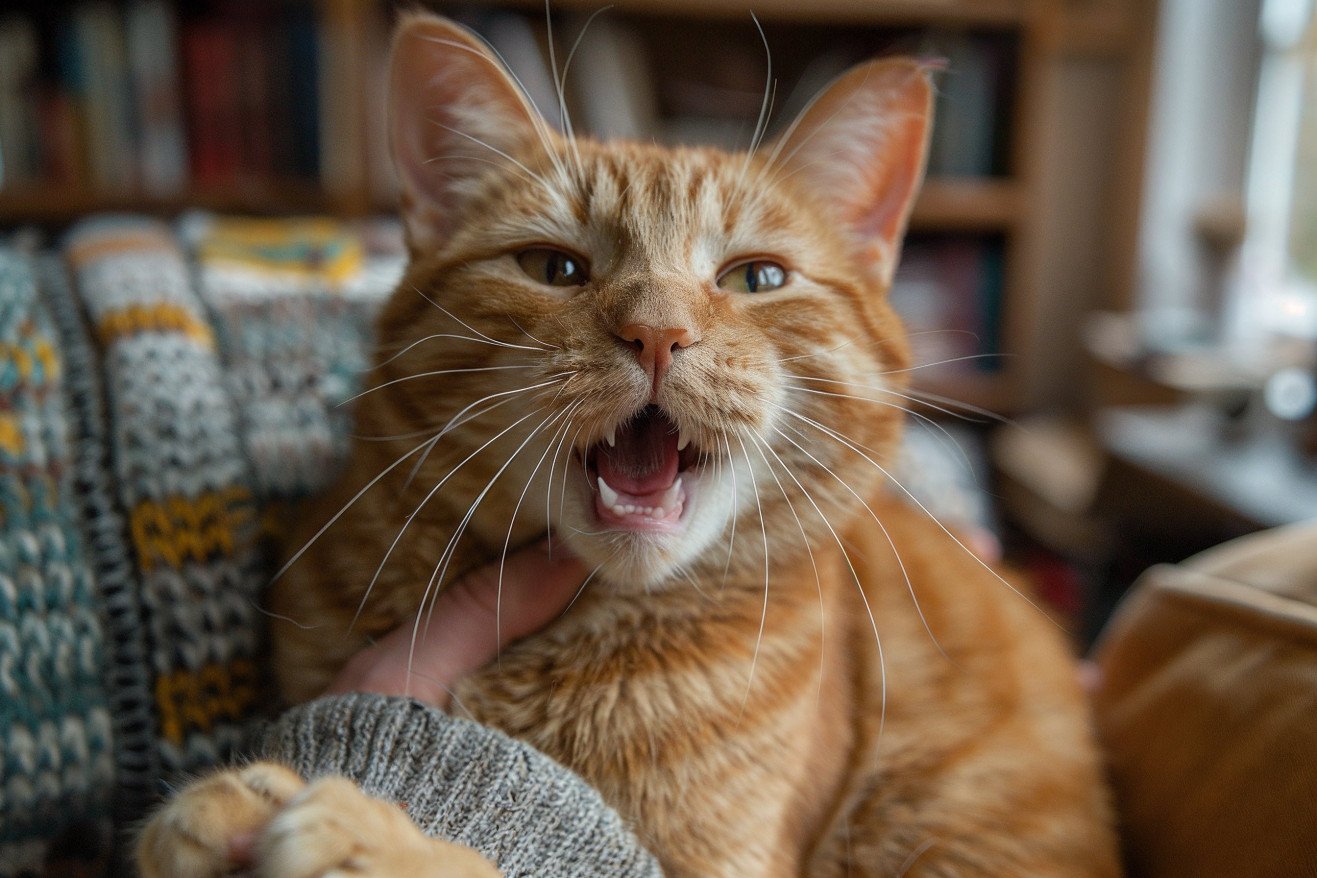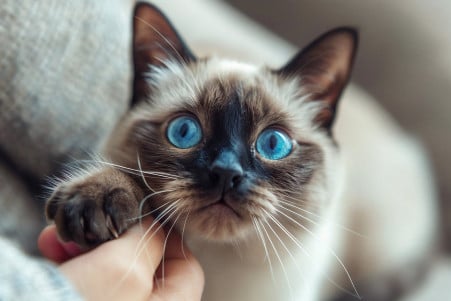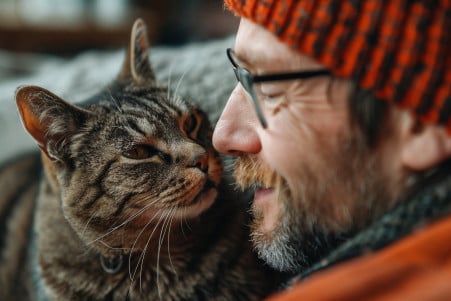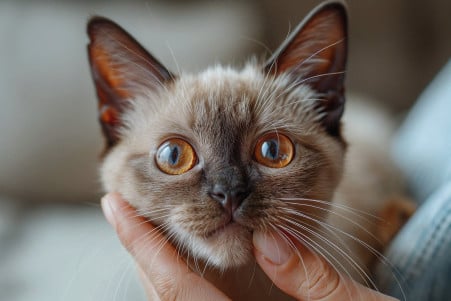Why Does My Cat Bite Me Gently While Purring? Understanding Your Cat's Biting Behavior
24 April 2024 • Updated 24 April 2024

If your cat has ever bitten you gently while you're petting them and they're purring and otherwise acting happy, you may wonder if it's a sign of love or something else. This behavior is known as "love biting," and it's a sign of affection. When your cat bites you while you're petting them, they're showing that they trust you and are comfortable with you. It's also a way for them to mark you with their scent. That said, petting-induced aggression is a real thing and can lead to biting in some cats.
To explore this topic, we'll look at studies from animal behaviorists and experts in cat behavior, body language, and communication. This interdisciplinary research helps us understand why cats bite during positive interactions, and it also helps us differentiate between love biting and aggression. With this information, you can better understand your cat, strengthen your relationship with them, and make sure that love bites stay sweet and gentle.
Why does my cat bite me gently while purring?
Where Love Bites Come From
The kneading and light biting that cats do while purring, often referred to as "love bites," has its roots in natural feline behaviors that are present from kittenhood. As described on Quora, kittens knead and gently bite their mother's nipples to stimulate milk flow while nursing. This instinctual behavior is soothing and can be a form of self-soothing even after kittens are weaned.
When adult cats knead a soft surface like a blanket or their human's lap and bite while doing so, they may be unconsciously reenacting the act of nursing. As pointed out by researchers on The Conversation, kneading is a sign of a cat that is happy, content, and feels safe and secure enough to take a nap.
Love bites may also be a holdover from wild cats who kneaded at the ground to create a soft bed for themselves and their kittens, according to Purina UK. The act of kneading may have also been a way to mark their territory with scent glands in their paws. So when your domesticated cat is biting while making "biscuits" on your lap, they may be marking their territory with this remnant of a wild behavior.
While love bites have their origins in natural instincts, knowing where they come from can help you understand your cat's cues and needs. This understanding can help you build a stronger relationship with your cat based on mutual understanding.
Love Bites as a Sign of Affection and Bonding
When a cat licks and nibbles gently on its owner, it may be a form of allogrooming, or social grooming, which is a common behavior in cat social groups and colonies, according to Cardboard Cat Homes. In this case, cats may consider their human family members and groom them to bond with them and show them affection.
As Meowingtons explains, love bites also release pheromones that help cats mark their humans and strengthen the cat-human bond. However, owners should be aware of signs of overstimulation during petting sessions, as The Vets point out that cats can get overstimulated from prolonged physical contact.
Reading a Cat's Body Language
Knowing how to read a cat's body language can help you tell the difference between love bites and aggression. Signs of a happy, loving cat include purring, slow blinking, and a loose body, according to Meowingtons. Signs of overstimulation include tail swishing, skin twitching, ears laid back, and walking away, according to Noot's Pets.
Meanwhile, aggressive biting is often accompanied by hissing, growling, dilated pupils, and a stiff body, according to the Cats.org.uk blog. Paying attention to these signs can help cat owners learn to better understand and respect their cat's boundaries and comfort levels during interactions.
Encouraging Positive Interactions and Play
Interactive toys and regular play sessions can help a cat learn to redirect their biting behavior, according to USA Today. Toys like wand toys and puzzle feeders can help cats stalk, chase, and 'hunt' in a controlled environment, which can help them expend energy and avoid boredom. Feliway also recommends giving treats to encourage cats to exhibit calm behavior and to help them associate petting with positive experiences.
That said, it's also important to make sure that you're respecting your cat's boundaries and giving them space when they need it. According to Care.com, it's important to make sure that you're paying attention to your cat's body language and adjusting your behavior accordingly in order to build trust and avoid unwanted biting. By encouraging positive play and respecting your cat's boundaries, you can help build a stronger relationship with your pet.
Tender Nibbles: Affection or Health Cues in Cat Behavior?
Sometimes, cats may bite more than you'd like or bite harder than you'd prefer because of a medical issue. As explained by Feliway, dental pain, skin problems, or neurological issues can cause pain and discomfort that can lead to a change in a cat's behavior, including biting. In addition, Preventive Vet points out that arthritis or other joint pain can make a cat more sensitive to being touched in certain areas, which can lead to a biting response.
Cats with cognitive dysfunction, as mentioned by the American Animal Hospital Association, can also experience behavioral changes, including an increase in biting, as they get older. If a cat's biting continues or seems to be happening out of the blue, it's a good idea to check in with a vet to make sure there isn't an underlying medical issue that could be causing the behavior.
Conclusion: Understanding the Nuances of Feline Communication
Gentle biting and nibbling are natural feline behaviors that can mean a number of things. As Puainta explains, cats may bite gently while playing, to show affection, to communicate, to explore, or due to overstimulation. That said, the way to tell the difference between these "love bites" is to look at the situation and the cat's body language.
While cats that purr while biting gently are often showing affection and playfulness, they may also be letting their human know that they've had enough stimulation, according to Cat World. By encouraging positive interactions, making sure to play with their cats regularly, and respecting their cats' boundaries, cat owners can make sure that they're deepening their bond with their pets.
If a cat's biting seems out of control or comes out of nowhere, it may be time to ask a veterinarian for help, according to Care.com. However, with time and attention, cat owners can learn to understand and enjoy this special form of feline communication.


